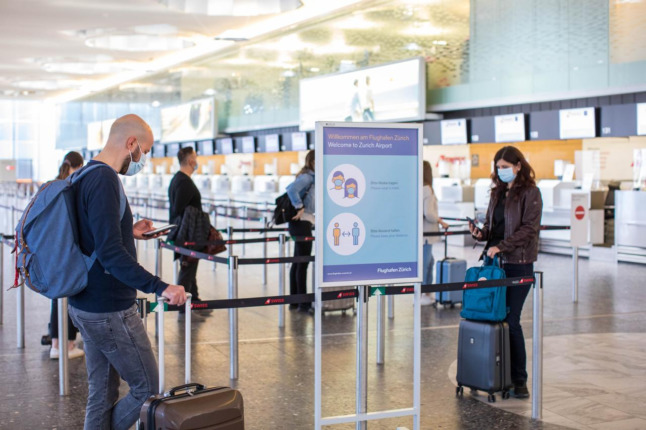The Swiss government has confirmed that people from outside the Schengen zone, including Americans and Brits, will be allowed to enter Switzerland from June 26th if they have been fully vaccinated or have recovered from the virus.
The government had previously announced the change would take place on June 28th, but had put it out for consultation with the cantons.
A spokesperson from the Federal Office of Public Health confirmed to The Local that the decision was made to bring the date forward to midnight on Friday, meaning that the new rules will be in effect on the 26th of June.
EXPLAINED: Switzerland to wind back coronavirus restrictions
“In view of the positive developments in the epidemiological situation and the progress made in the field of vaccination, the Federal Council is proposing to greatly relax the prescriptions and health measures at the border for people entering Switzerland”, authorities said.
This means not only that there would no longer be any testing or quarantine requirements for vaccinated arrivals for citizens of Schengen area states, but also for those coming from third nations, that is, countries outside the EU / EFLA.
From June 26th border health control will focus on arrivals from countries with a worrying variant of the virus (VOC): currently, these areas include Brazil, Canada, India, South Africa, Nepal, and the UK.
However, even arrivals from VOC countries who have been vaccinated within the past 12 months or recovered from Covid within the past six months — and can prove it — can enter Switzerland without any obligation to test or quarantine.
All others should show a negative PCR or rapid antigen test result and then go into quarantine. The Federal Council said.
There are, however, some exemptions from these requirements for people from variant countries. You can read about them here.
READ MORE: What exceptions allow unfettered travel from ‘variant’ countries to Switzerland?
Filling out the passenger locator form will still be obligatory for all passengers arriving by air, but not for those using land transportation.
What does this mean for travellers from the United States?
For the first time since Switzerland closed its borders in March 2020, American tourists will be able to come to here — but only if they’ve been vaccinated. If not, they would have to test and quarantine for 10 or seven days, which pretty much defeats the purpose of a vacation.
The same rule applies for those arriving from Canada, even though it is considered a VOC area.
While the restrictions on arrivals from the USA have been lifted, Swiss citizens still can’t go to the United States at the moment.
However, there’s some hope that this issue might be resolved when Swiss president Guy Parmelin, meets with his US counterpart Joe Biden in Geneva on Tuesday.
How was the decision made?
On June 11th , The Local wrote that even though US health authorities now authorise travel to Switzerland for vaccinated people, travel ban is still in place on the Swiss side for most third countries, including the United States.
READ MORE: US reclassifies Switzerland: What does it mean for American travellers?
However, that was before the Federal Council announced on Friday afternoon that it would likely be lifting remaining travel restrictions on June 28th.
On June 23rd, the Swiss government confirmed that people from third countries – including Americans – would be allowed to enter from June 28th.
Initially, Swiss media reported that the changes would come into effect on June 28th, however this was also brought forward to June 26th.



 Please whitelist us to continue reading.
Please whitelist us to continue reading.
and the UK. Really great news, travel can restart.
Great update, thank you! Keep us updated!
Please could you clarify for me – are fully vaccinated adults from the UK allowed to enter Switzerland now?
Not until 28th June, as I read it, and providing that this is approved on 23rd June.
And you waited until now to report this news of Friday? I will be requesting a refund of my subscription.
Thanks for the update. I have a ticket to fly to Munich from California in mid-July and leaving from Geneva in early August. I have been vaccinated for three months and look forward to international travel to resume after three canceled trips. I can make some hotel reservations and plans stops during the three weeks of vacation in Central Europe.
I was vaccinated in the US in January and February 2021, which was early in the US cycle due to my age being given priority. I plan to travel to Switzerland in late August for 4 weeks. As I read it now, I would not be accepted??
Hi Alex,
This has since been changed by the Swiss government. Now, protection will last 12 rather than six months. The article has been updated to reflect that change.
https://www.thelocal.ch/20210615/covid-19-health-passport-switzerland-extends-vaccination-protection-to-12-months/
My daughter and grandaughter coming in the month of september .They are living with me during vacation of one month .Are they needed to be quarantine .No history of covid desease ,daughter recieved full vacinne and grandaughter is 10 yrs of age .Coming from Canada !